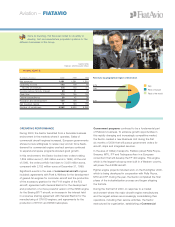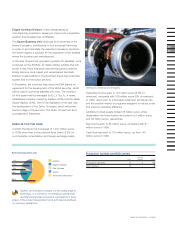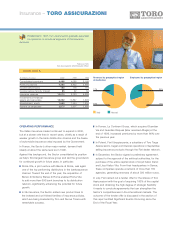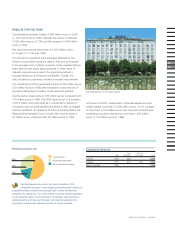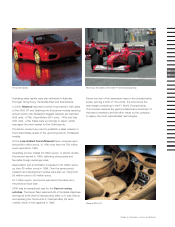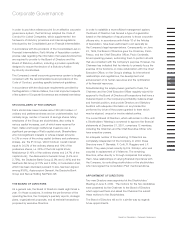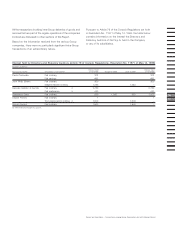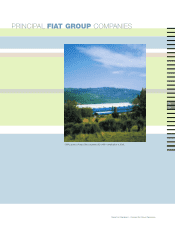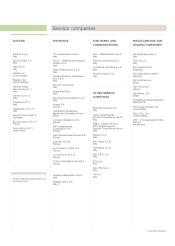Chrysler 2000 Annual Report Download - page 79
Download and view the complete annual report
Please find page 79 of the 2000 Chrysler annual report below. You can navigate through the pages in the report by either clicking on the pages listed below, or by using the keyword search tool below to find specific information within the annual report.
COMPENSATION OF DIRECTORS AND COMPENSATION
COMMITTEE
The Board of Directors established a Compensation
Committee consisting of four Directors, including two with
executive authority (Chairman Paolo Fresco, Paolo Cantarella,
Franzo Grande Stevens and John F. Welch).
The Compensation Committee has the task of developing
proposals to be submitted for approval to the Board of
Directors regarding:
❚appointments to corporate posts at Group’s subsidiaries,
and the respective development and back-up plans;
❚general and individual compensation packages for first
level Group managers and stock option plans;
❚compensation to Directors with executive authority,
including stock option plans.
The Chief Executive Officer does not attend meetings where
his compensation is discussed and the Chairman and Chief
Executive Officer do not attend meetings where the
compensation of the Chairman is discussed.
In 2000, the Compensation Committee met four times.
Important topics on the Agenda included the definition of
stock option plans for the Group’s senior managers.
The Board of Directors, with the favorable opinion of Statutory
Auditors, determines the compensation of those Directors who
are asked to perform special tasks. The entire compensation
payable to the Chairman is variable, while only a portion of
the compensation payable to the Chief Executive Officer is
variable. In both cases, as explained in a special schedule
included in the Notes to the Financial Statements, the variable
compensation is based on the average market price of the
Fiat ordinary share. These two Directors are also covered by
the stock option plan, which is reviewed in detail in the Notes
to the Financial Statements.
INTERNAL CONTROL SYSTEM AND AUDIT COMMITTEE
With regard to the Internal Control System, the Company
already has a Code of Ethics, which it published several years
ago. In May 1999, it adopted and disseminated an Internal
Control Policy and the Board of Directors established an Audit
Committee that provides it with consulting and decision-
making support and performs functions that are consistent
with the guidelines of the Code of Conduct.
This Committee comprises four non-executive Directors and
is chaired by G. Galateri. It meets at least twice a year, or
whenever a meeting is requested by the Chairman of the
Board of Statutory Auditors or by one of the Supervisors of
the Internal Control System. The Chairman of the Board of
Directors, the Chief Executive Officer and representatives of
the independent auditors are invited to attend meetings of the
Audit Committee.
The Audit Committee met twice in 2000. On those occasions,
it discussed several issues with the specific purpose of
obtaining detailed information on the risk assessment process
followed by the Group’s industrial Sectors and of ascertaining
the true efficacy of the Internal Control System.
The Supervisors of the Internal Control System are appointed
by the Board of Directors. While performing this task they do
not follow under the jurisdiction of operations managers, but
report directly to the Audit Committee and, upon request, to
the Board of Statutory Auditors.
ADDITIONAL CORPORATE GOVERNANCE PROCEDURES
AND GUIDELINES
The Company has adopted an internal procedure for the
handling of confidential information that defines the functions
and responsibilities of those who are charged with handling
such information and deciding when it should be made public
in accordance with the rules that govern the disclosure of
price-sensitive news. The true purpose of this procedure is to
prevent and avoid potential leaks of confidential information.
It imposes the penalties that the Code of Ethics provides for
employees who violate confidentiality obligations.
It is in the interest of the Company to establish and maintain
an ongoing dialog with its stockholders and institutional
investors. With this in mind, Fiat created specific entities
responsible for managing these relationships. The Group’s
website (www.fiatgroup.com) is used to disseminate
operating and financial information on a regular basis and
in connection with special transactions. In addition, a
toll-free number (800-804027) and two e-mail addresses
([email protected] and
investor[email protected]oup.com) are available to
anyone seeking additional information. Discussions and
meetings with institutional investors are held frequently.
Regulations were adopted last year to ensure that
Stockholders’ Meetings run in an orderly and efficient fashion.
These Regulations define the rights and obligations of all
parties attending a Stockholders’ Meeting, providing clear and
unambiguous rules, without limiting or in any way hampering
the right of individual stockholders to voice their opinions
and demand explanations about the items on the Agenda.


